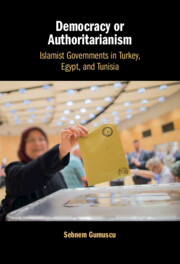Book contents
- Democracy or Authoritarianism
- Democracy or Authoritarianism
- Copyright page
- Contents
- Figures
- Acknowledgments
- Abbreviations
- Introduction
- 1 Modernization, Inclusion, and Power
- 2 A Theory of Intraparty Politics
- 3 The AKP’s Pivot from Liberal Democracy to Electoral Islamism
- 4 Electoral Islamism and Killing the Dream of a Democratic Muslim Brotherhood
- 5 Ennahda’s Path toward Liberal Islamism
- Conclusion
- Interviews
- Bibliography
- Index
4 - Electoral Islamism and Killing the Dream of a Democratic Muslim Brotherhood
Published online by Cambridge University Press: 09 March 2023
- Democracy or Authoritarianism
- Democracy or Authoritarianism
- Copyright page
- Contents
- Figures
- Acknowledgments
- Abbreviations
- Introduction
- 1 Modernization, Inclusion, and Power
- 2 A Theory of Intraparty Politics
- 3 The AKP’s Pivot from Liberal Democracy to Electoral Islamism
- 4 Electoral Islamism and Killing the Dream of a Democratic Muslim Brotherhood
- 5 Ennahda’s Path toward Liberal Islamism
- Conclusion
- Interviews
- Bibliography
- Index
Summary
After 84 years of struggle, the Muslim Brotherhood rose to prominence in Egyptian politics in the wake of the Arab uprisings. On the night of his election, Mohamed Morsi promised to unite all Egyptians – Muslim and Christians, men and women – and to advance the revolutionary cause for democracy, human rights, and dignity. Over the next 365 days, rather than uniting and democratizing his country, he alienated large segments of the population through exclusionary politics, majoritarianism, and polarization. Why did the Muslim Brotherhood follow majoritarian and polarizing politics after coming to power? This chapter seeks to solve this puzzle by way of unpacking the Brotherhood’s internal power dynamics and disagreements regarding democratic politics. To that end, the chapter begins with a short historical account, tracing the Brotherhood’s changing relationship to politics and emerging splits within. Then, it turns to the shifting power balance between the old guard and liberal Islamists, and how the former sidelined the latter. The chapter discusses three critical episodes in this process: the Wasat Party initiative of 1996, the 2009–10 internal elections, and the post-2011 purge of the liberals. It concludes with a discussion of what the old guard’s perception of democracy looks like in action with details from Morsi’s year in presidency.
Keywords
- Type
- Chapter
- Information
- Democracy or AuthoritarianismIslamist Governments in Turkey, Egypt, and Tunisia, pp. 143 - 201Publisher: Cambridge University PressPrint publication year: 2023



